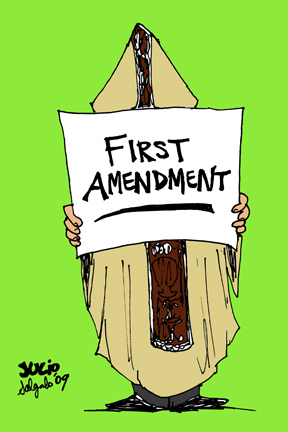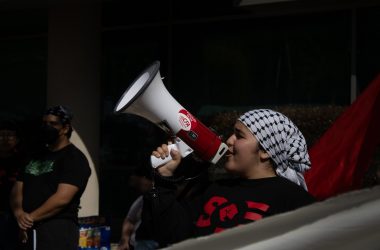The U.S. Supreme Court has recently been tackling some controversial First Amendment issues questioning the separation of church and state.
In probably the most disturbing case the high court had on its docket, the Roman Catholic Diocese of Bridgeport attempted to hide behind the First Amendment to shield details of lawsuits filed against priests involved in child molestations.
The Supreme Court rightly bounced the church’s request.
Normally, we would take up the banner in the church’s favor. After all, we’re all about the First Amendment, for both its implied rights and its inferred responsibilities. In fact, we are defending the First Amendment by hailing the Supreme Court’s decision.
We’re not issuing an indictment against the Catholic Church or Catholics. The battle is over right and wrong, and clearly the church is wrong on this one.
The recent Supreme Court battle pitted the church against the American public, the media, the government and the law — four worthy adversaries under any circumstances, but even more so when they fight on a united front.
On the public end, four newspapers, including The New York Times, demanded more than 12,000 pages of depositions regarding alleged pedophile priests.
The demand was for public records, which every person has the right to access. Once a defendant has been deposed, the church has no right to ask for the court records to be blocked from public view — they are public property.
The court didn’t construe that the government was meddling or interfering with religious freedom. The only way to muddy those waters would be if the Catholic Church actually sanctioned molesting altar boys as some form of spiritual ceremony. Here, the public interest also takes priority.
The clauses in the First Amendment relating to religious freedom “prohibits the Congress from making laws ‘respecting an establishment of religion,’ prohibiting the free exercise of religion.” None of these rights were infringed upon by releasing public documents.
We all have the right to know when, if and where there might be pedophiles preying on children, how the church deals with the problem and how it is resolved legally. The law meant to protect children, forces convicted sex offenders to register with law enforcement agencies — for life.
The Catholic Church has been shuffling accused child molesters from parish to parish for nearly a quarter of a century. In 1985, Gilbert Gauthe pleaded guilty to 11 counts of molesting boys under 18. In 2002, five Boston priests were accused of pedophilia and the church paid the victims hush money to protect the image of the priests and the church.
Public interest? The church didn’t air its dirty laundry; the Boston Globe broke the story — practicing its rights under the First Amendment. What the church did by sheltering accused child molesters from the reach and scrutiny of the law was to place more children in harm’s way.
The Bridgeport diocese argued a fallacy about separation of church and state that bordered on deplorable. The church attempted to bastardize the Constitution, which would have been dangerous to both the public and other religions.
The Supreme Court’s decision this time was truly a victory for transparency. While religious freedom should be constitutionally protected, no religion should be able to hide behind the First Amendment’s shield to harbor criminals.




